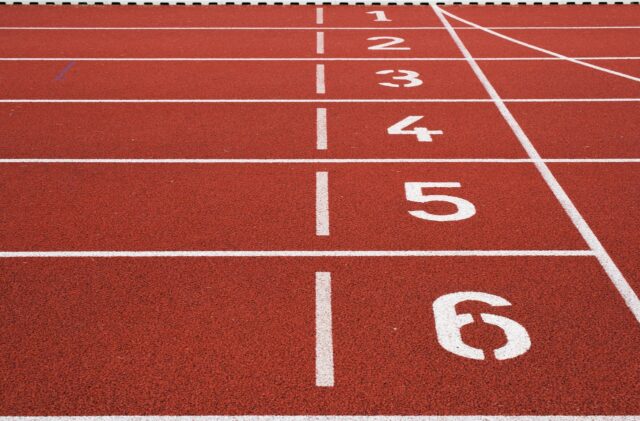By Braden Keith on SwimSwam
The debut of Grand Slam Track in Kingston, Jamaica last weekend, which is track & field’s attempt at a national made-for-television series, was received with mixed reviews. The rollout has been a bit reminiscent of swimming’s International Swimming League, which limped through three seasons before eventually disappearing into the Russian invasion of Ukraine.
Field events were excluded.
Led by 4-time Olympic champion and track superstar Michael Johnson, the league has raised at least $30 million in financial commitments from their partners, including a large investment from Winners Alliance, which bills itself as an “athlete-centric commercial alliance.”
The scale of that money is very similar to what is rumored to have been spent per season of the ISL, which was created by Konstantin Grigorishin, a wealthy Russo-Ukrainian billionaire who took a keen interest in the sport of swimming (his son swam at Cal).
The prize money is similar too, though the scoring system is different. There are no teams, but instead events are grouped into “categories,” and the top 8 performers in each category win between $10,000 and $100,000.
The criticisms of the meet’s debut from track & fields hardcore fans echoed eerily similar to those ladled upon the ISL: empty stands, lack of splits, poor camera work, and a lack of effort by athletes.
A thread of complaints from LetsRun.com.In trying to ‘reinvent’ the sport, the organizers of both seemed to lose some of the fundamentals of exciting sport presentation. The innovation didn’t completement what is known to work; rather, axioms that are borne out over dozens of sports and dozens of year, in favor of a pseudo-innovative, but pseudo NBC-Olympics-style-broadcast where commentators tell us about the importance of the trailing pack but the cameras don’t show them finishing. That doesn’t undermine that the commentary team was pretty good, overall.
View this post on InstagramA post shared by KFC Jamaica (@kfcjamaica)
Grand Slam Track also suffered from slow times. The ISL, generally, always had some pretty fast results (including several World Records), though the team battle did diminish the reliance on fast times to create excitement. The ISL’s equivalent problem may have been more on the imbalanced nature of most events, where the outcome of the team scoring was decided very early on.
But the biggest critique of Grand Slam Track was the pacing – without field events (or human interest stories) to fill in the gaps between races, the sessions seemed like they dragged on to their 3 hour conclusions. This was fundamentally not a problem in ISL meets, where the competitions roared through races at a breakneck pace – one of the strengths of the league’s format.
Track and swimming share a lot of bonds. They’re blue-blood sports that have existed since the dawn of sport, they’re ‘fundamental’ sports that seem to be core to human existence, and their sports where a bunch of competitors lineup and see who can do it the fastest. While there are some key differences that distinguish their fates, the two sports do seem inevitably linked in learning – both sports can benefit greatly from watching, and learning, the others.
There is one key difference between Grand Slam Track and the ISL, though, that gives it a chance, and it’s this Tweet from Michael Johnson:
What can we do over the season to make @GrandSlamTrack better?
— Michael Johnson (@MJGold) April 8, 2025
As silly as it seems, this one Tweet is what gives me hope for Grand Slam Track where the ISL ultimately failed. For those of us working in and around the sphere of the league, there was one consistent narrative: the ISL didn’t want any feedback. They had it all figured out, they were sure of their path, and even when the money and fans weren’t coming, feedback was treated with an “enemy of the state” attitude. That is from team owners, media, coaches, fans, and yes: even the athletes themselves.
Michael Johnson is asking for feedback, and while his other social media posts have definitively focused on the successes without explicitly acknowledging the failures, but he is, at least, asking the question.
Now we’ll watch and see if dogma takes hold or if any of the feedback is taken into account in future editions.
As swimming looks for a pivot that can revive interest, keep watching what’s happening in this space, and many others. It’s going to take a hivemind to come up with something that works, and while not every voice is going to be right, every voice matters in the effort.
The next meet will be May 2-4 in Miami, followed by May 30-June 1 in Philadelphia and June 27-29 in Los Angeles.
Read the full story on SwimSwam: Grand Slam Track’s Debut in Kingston, Jamaica Met With Mixed Reviews, Learning Opportunities
Read More Details
Finally We wish PressBee provided you with enough information of ( Grand Slam Track’s Debut in Kingston, Jamaica Met With Mixed Reviews, Learning Opportunities )
Also on site :
- I’m the Boston Celtics legend who has a perfect 6-0 record vs Michael Jordan in the playoffs and was the one NBA star that MJ couldn’t beat
- Oliver Morgan Shatters British Record In 100 Backstroke, 2 In The World This Year
- Here’s How to Pray the Official Novena to Soon-to-Be Saint Carlo Acutis

